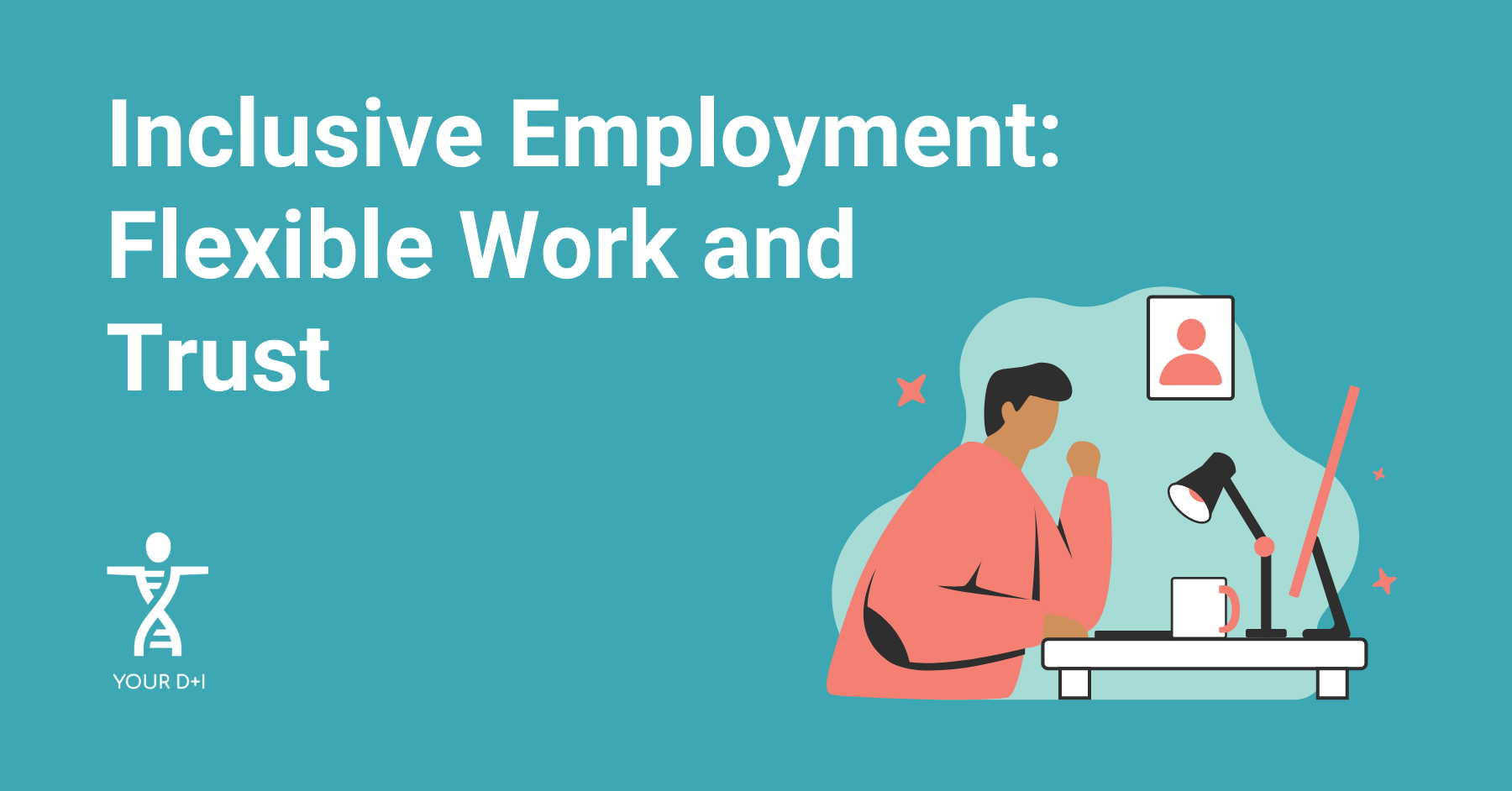Inclusive Employment: Flexible Work and Trust
In the current climate, allowing flexibility is almost a necessity for employers who want to be inclusive. After all, flexible work provides access for many people who were previously unable to enter the workforce. Busy parents or carers and people with disabilities or health issues are just a couple of examples. Having access to previously unreachable candidates also benefits businesses by giving them a larger talent pool.
However, flexible work arguably comes with some level of risk for employers too. Whether it’s remote work or non-standard working hours, flexible work generally reduces an employer’s ability to monitor employees. You may wonder how you can know your staff are actually working the hours they say they are. And can you trust an employee to stay focussed if they’re taking frequent breaks?
Today’s post will explore how flexibility also benefits businesses, how employers can reach mutual trust with flexible employees and how that very trust could be the key to success. But, first, let’s take a look at what we actually mean by flexible work.
What is flexible work?
The definition of flexible work can vary per person, just as the way each person uses flexible work varies. ‘Flexible’ is sometimes used to indicate a job that is worked either partly or fully away from the office, usually down to the employee’s preference.
However, flexible work can also refer to jobs with varied or adjustable hours. This can include employees choosing their own start and finish times and taking more or longer breaks. Often, this means staff have the freedom to complete a certain number of hours of work or a specific set of tasks when they choose.
While we mainly think of flexible work as benefiting employees, it can also serve businesses too. In addition to the wider pool of candidates and appeal to modern demands, flexibility can help reduce costs (such as running a physical office space) and even extend your company’s working hours.
Perhaps the biggest benefit of flexible work for employers, though, is what they get back from their staff. Flexibility can improve staff satisfaction and retention as well as reducing absenteeism. Enabling staff to choose the way of working that gives them the best work-life balance will simply make them better employees.
Benefits of flexible work
Flexible hours and holidays can be of great benefit to both employee and employer. If a staff member knows they will be able to take time off when they need it, they’re far more likely to be honest with you. This means staff are less likely to misuse sick days or fake family emergencies.
Flexible work also means staff won’t force themselves to work when they’re just not capable of high productivity. For example, if an employee didn’t get any sleep last night, they’re not going to perform well today. Allowing staff to take days off in situations like this puts their minds at ease and means employers get their staff at their best.
Similarly, if an employee is feeling mentally unwell, ensure they can take mental health days away from work. Encouraging them to push through and come in when they won’t be productive benefits nobody. Allowing mental health days also helps build trust and support that will encourage honesty and loyalty down the line.
Building mutual trust
While employers may struggle at first to fully trust flexible employees, doing so will usually reward them greatly. If someone feels their employer trusts them to do their job in the way they want, they are likely to act worthy of your trust. This means most flexible employees will continue working at the same standard or even go above and beyond.
Flexible work has become the preference of many employees, especially during the COVID-19 pandemic. This means staff are more likely to be grateful and loyal to their flexible employer than dishonest or exploitative when introducing flexibility. The pandemic has allowed people to test out working from home and whether or not it works for them. Therefore, if an employee says they prefer remote work, it’s probably because they know it’s how they work best.
As we’ve established, trust is often earned when it is received, but that means one party must make the first leap. Saying yes to flexible employees immediately shows them that you care about and understand them and their needs. However, there still may be times when you need to say no.
Where to draw the line
Flexible work, by nature, allows employees to work in a way that better suits them. However, having defined limits for your flexibility can be very important. For one, boundaries can curb any employees who do want to take advantage of your policies. Secondly, it ensures that flexible work still serves your business.
For example, you may have set times within the day that your clients need to get in touch. In this case, you will want to ensure flexible work doesn’t mean there are times when nobody is contactable. Similarly, if in-person collaboration is highly important for a certain role, you may need to restrict an employee’s time working from home.
Giving employees complete freedom can also lead to them feeling overwhelmed. To combat this, explain any new management and admin tasks they need to do. Also, creating boundaries around how long staff should work, how much holiday they can take and when their deadlines are can be useful.
Boundaries can benefit your employees in other ways too. For example, setting times of the day in which their colleagues can reach out to them prevents the collapse of work-life balance sometimes associated with working from home. You can even set up out-of-office email replies if someone contacts employees who have logged off for the day.
If a certain employee does appear to be taking advantage of your flexibility, introducing boundaries can help. Start a conversation to find out if anything else is affecting their productivity and if adding rules would help. If they don’t understand when they can and cannot take breaks or holiday, for example, clarify this for them.
Trust the process (and your employees)
Flexible work comes with many benefits for both employees and employers. By establishing trust and setting boundaries, businesses can reap just as many rewards from flexibility as their staff can.
Remember that finding a balance of flexibility that works for your business and its teams is a process. It may take time to find something that works just right, and you might have to start it all over again with each new employee.
However, by putting trust in your staff, you are likely to receive that trust back. This can leave you with increased productivity, loyalty, employee satisfaction and monetary savings. If you find that your employees or candidates are requesting more flexible work, why not give it a go?


